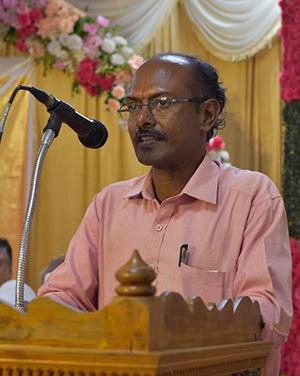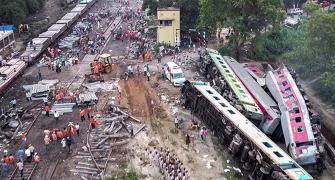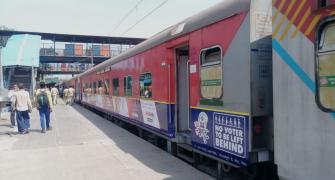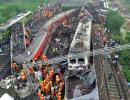'Because of the callous attitude of the railway administration, they don't take care of safety.'

The three train collision that resulted in the deaths of 288 people on June 2, 2023, is the worst train accident in India this century.
Ten days later, various theories are floating around about the cause of the accident.
Was it a technical error? Or a human error? Or sabotage?
How unsafe does a loco pilot feel in situations like these? In what kind of conditions do they work?
K Parthasarathi, a loco pilot and the south zone joint general secretary of the All India Loco Running Staff Association, reveals the problems loco pilots face.
"It is a great struggle. Because of work pressure, we make small mistakes like Signal Passing at Danger. Do you know what steps the Railway Board is taking to avoid this type of accidents? They want to counsel our families and ask them not to engage their husbands in day-to-day household activities!", Parthasarathi tells Rediff.com's Shobha Warrier in the concluding segment of a two-part interview.
- PART 1 of the Interview: 'Chances of sabotage are very remote'

As a loco pilot who is in the front of the train, how unsafe do you feel these days?
We do feel unsafe. That's the truth. For example, we believe what the green signal says and follow it blindly.
The Coromandel Express was going at a speed of 128 kmph and what did the signal say? That it should move to the loop line instead of the main line. And what happened?
When things like this happen, we lose confidence.
When we talk about safety, it falls on the deaf ears of the authorities. Only when accidents like this happen can we express our feelings to the public.
We know after five days the news will go to the fifth page or the last page, and nobody will be interested in what we say. Everything will be forgotten.
It is just like how the public feel about travelling in trains. They still feel safe travelling by train than travelling by road.
After this accident, do people stop travelling by trains? No.
After the media hype cools down, people also forget about these accidents.

Do the Railway authorities also stop listening to your complaints?
Yes. They just ignore our complaints. We have so many issues and we have been repeatedly telling the authorities, but no action has been taken.
In 1973, after a Railway strike, on the floor of Parliament, the then railway minister assured that the duty hours of loco pilots would be reduced to 10 hours.
It is 2023. Even after 50 years, it has not been implemented yet.
Because of our continuous struggle, in 2013, a committee was formed to study the duty hours and rest period hours of train drivers. It had recommended 40 hours of periodical rest in a week.
Do you know how they arrived at 40 hours? This is what other workers have, those who work 6 days a week, those who go home after 5 pm and come back to work in the morning, and those who get 24 hours rest on Sundays.
Compare this to the weekly rest a loco pilot gets. Only 14 hours in a week! How can people like us take care of our personal needs, needs of the family and have a social life?
Even though the committee has made recommendations, the Railway Board is not ready to accept them.
How many hours are you expected to work daily?
It depends on the trip. We have running duty and overall duty. Before the trip starts, we have to do some preliminary work, which is called preparatory and complementary duties.
So, we have to work 11 hours which include 9 hours of running duty and 2 hours of preparatory duty.
If the train does not reach the destination in 11 hours, we have to work some more hours.
So, in general it becomes 12 hours, 13 hours, 14 hours and even 15 hours.
Recently, in Bilaspur division, an accident happened. It was not highlighted in the media because it involved goods trains. It was a head on collision and a very big accident.
One of the drivers of the goods train had worked 14 hours.
There was also another issue with the rakes. They had the bogey mounted brake system and these types of rakes have had problems in braking.
It was accepted by the Railway Board that these types of rakes were problematic. Still, they were not withdrawn from service.
What they did was continue with the accident-prone rakes with some speed restriction.
How can you follow restricted speed when the brakes do not work properly?

Does that mean the safety of those who run the trains is overlooked by the higher officials?
Definitely. Whatever complaints we make, we do them not just for our comfortable working conditions, but for the safety of the passengers too.
Because of the callous attitude of the railway administration, they don't take care of safety.
I will give you another example. So many women loco pilots are recruited now. Do you know something? In the engine cabin, there is no toilet. Without a urinal facility, how do you expect loco pilots to work in non-stop trains for 7 hours?
Because there is no urinal, we don't drink water. We just carry a small bottle of water for our needs. Because of this, we get health issues like kidney stones.
Will this not affect our concentration and work?
But they don't look into such matters at all.
And when accidents happen like this happen, they say, it may be human failure.

After the accident, the Congress president said, quoting the CAG report, that the government has reduced safety funds by 79%...
Yes, the CAG report talks about the safety fund created by the government called RRSK.
The government said they would put Rs 5,000 crore (Rs 50 billion) into the RRSK fund every year and there will be Rs 20,000 crore (Rs 200 billion) in 4 years.
Do you know what the actual allotment was?
In 2017-2018, there was nothing.
In 2018-2-19, Rs 3024 crores (Rs 30.24 billiion instead of the promised Rs 5,000 crores.
In 2019-2020, instead of Rs 5,000 crores, they gave Rs 201 crore (Rs 2.01 billion).
In 2020-2021, it was Rs 1,000 crores (Rs 10 billion).
So, in the last 4 years, instead of the promised Rs 20,000 crores, they gave Rs 4,225 crores (Rs 42.25 billion)!
It shows they have not given any priority to allot funds for safety.
 IMAGE: K Parthasarathi. Photograph: Kind courtesy K Parthasarathi
IMAGE: K Parthasarathi. Photograph: Kind courtesy K ParthasarathiAnother controversy is about the installation of kavach....
The minister said kavach would not have prevented this accident. It is true this was not a head on collision.
But the question is, should all the trains be fitted with anti-collision devices? They cannot deny that kavach was not installed in all the trains because of lack of fund allotment.
Allotment of funds is a major issue with the Railways.
Is it true there are a lot of vacancies to be filled in the Railways, and the reason for long hours for loco pilots is because of shortage of staff?
It is true. In the Rajya Sabha, it was said that 3.12 lakh (312,000) vacancies have to be filled.
I told you about us loco pilots working long hours. We are forced to work long hours because there are not enough drivers to release a driver.
Whenever you go for duty, how does your family feel? Do they feel stressed and nervous?
Of course, they do. That's why not many people are coming forward to take up this job.
It is a great struggle. Because of work pressure, we make small mistakes like Signal Passing at Danger.
Do you know what steps the Railway Board is taking to avoid this type of accidents?
They want to counsel our families and ask them not to engage their husbands in day-to-day household activities!
Feature Presentation: Ashish Narsale/Rediff.com









